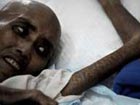| Videos | • Latest |
|
• Feature | • Sports | • Your Videos |
Asian AIDS patients facing funding crisis

 0 Comment(s)
0 Comment(s) Print
Print E-mail
CNTV, December 1, 2011
E-mail
CNTV, December 1, 2011
Four million people are living with HIV/AIDS in South and Southeast Asia. With over 250-thousand new cases reported last year, patients in the region are facing many problems, including a shortage of free treatment and limited access to information.
This thirty-eight year old feels his home country has offered him few opportunities.
Born in Pakistan with an intersex anatomy, meaning he had male and female genitalia, Mazhar Anjum was excluded from society and forced into a life of prostitution.
He found out he had AIDS in 2007.
Mazhar Anjum, AIDS patient, said, "When I found out that I had AIDS, my whole life was turned upside down. All my friends and peers abandoned me as soon as they found out about the disease. My house literally had a padlock outside. Everyone left me. I had this one sister in Karachi, she helped me a lot. She passed away two years ago. She was the only one who stood by me while everyone else fled."
Life is gradually getting better for Mazhar. He started treatment three years ago and has so far experienced few side effects.
For now the real problem is money, as the medicine swallows up all of his savings.
Due to his health, he cannot go back to his old profession. Instead he works for a pittance in a small general store.
Mazhar's story is not unique in the region.
In Cambodia, charities have been providing many AIDS patients with free drug programs. This doesn't come cheap, as millions of US dollars are spent every year. But as the rate of infection and fatalities have decreased, so has the NGO funding.
This 28-year old woman was infected with the virus by her husband. He worked as a security guard for a night club in the Cambodian capital, Phnom Penh. One of her children recently died from AIDS.
Peo Siphon, AIDS patient, said, "I appeal to the NGOs to help us, we did not want this to happen but it happened."
These victims don't need just money, but emotional and psychological support as well, which is scarce. So is awareness about the virus.
But in Bangladesh, many are trying to change that. Taking to the streets of the capital, Dhaka, hundreds of Bangladeshis are calling for more access to information.
They are also marking World AIDS Day. But unfortunately for many, they have already lost their battle.






Go to Forum >>0 Comment(s)